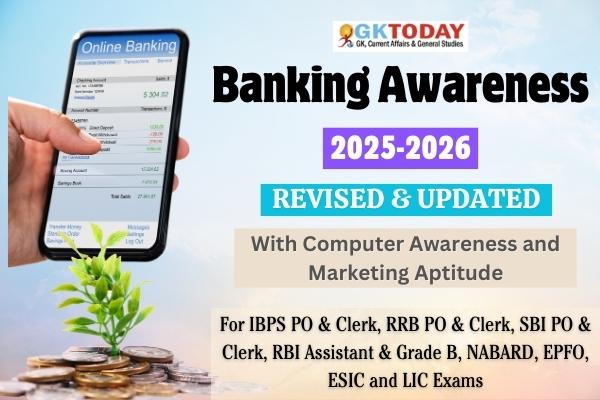Banking & General Financial Awareness
Banking & General Financial Awareness Multiple Choice Questions (MCQs) and Answers with explanation for All Banking Exams of 2024-25 such as IBPS Bank PO, IBPS Bank Clerical, RRB PO and Clerical, SBI PO and SBI Clerical, IBPS Recruitments, RBI Grade B and RBI Banking Examinations.
1. Which is the oldest Joint Stock bank of India?
[A] Allahabad Bank
[B] Bank of Baroda
[C] Patiala Bank
[D] Bank of India
Show Answer
Correct Answer: A [ Allahabad Bank ]
Notes:
A bank that has multiple shareholders is called joint-stock bank. Oldest Joint Stock bank of India was Bank of Upper India that was established in 1863. But this bank failed in 1913. India’s Oldest Joint Stock Bank which is still working is Allahabad Bank. It is also known as India’s oldest public sector bank. It was established in 1865.
2. CRILC (Central Repository of Information on Large Credits) is a borrower level supervisory dataset that keeps records of loan of__?
[A] 5 Crore and above
[B] 5.2 Crore and above
[C] 6 Crore and above
[D] 8 Crore and above
Show Answer
Correct Answer: A [5 Crore and above]
Notes:
Central Repository of Information on Large Credits is a borrower-level supervisory dataset that keeps the record of loans of Rs 5 crore and above. In India, there are four privately owned credit information companies (CICs). They are CIBIL, Equifax, Experian and High Mark Credit Information Services.
3. Who manages the Foreign Exchange control in India?
[A] RBI
[B] SEBI
[C] NABARD
[D] Central Government
Show Answer
Correct Answer: A [RBI]
Notes:
RBI i.e. Reserve Bank of India has an important role in regulating & managing Foreign Exchange of the country. It manages forex and gold reserves of the nation. The RBI’s Financial Markets Department (FMD) participates in the foreign exchange market by undertaking sales / purchases of foreign currency.
4. Which of the following is the largest Credit Rating Agency in India?
[A] CRISIL
[B] ICRA
[C] CARE
[D] SMERA
Show Answer
Correct Answer: A [CRISIL]
Notes:
Indian credit rating industry mainly comprises of CRISIL, ICRA, CARE, ONICRA, FITCH & SMERA. CRISIL is the largest credit rating agency in India, with a market share of greater than 60%.
5. What is the maximum loan amount permitted under the Personal Loan in India?
[A] Depends upon the income of the borrower
[B] Maximum amount is such that EMI is not more than 40-50% of the monthly income.
[C] Unlimited
[D] Both a and b
Show Answer
Correct Answer: D [Both a and b]
Notes:
Maximum amount for personal loan usually depends on your income and varies based on whether one is salaried or self-employed. Usually, the banks restrict the loan amount such that your EMI isn’t more than 40-50% of your monthly income.
6. Who of the following plays the vital role in setting up of National Housing Bank?
[A] K. R. Puri
[B] Dr. Minoan Singh
[C] C. Rangarajan
[D] None of the Above
Show Answer
Correct Answer: C [C. Rangarajan]
Notes:
A High Level Group under the Chairmanship of Dr. C. Rangarajan was set up under the then Deputy Governor, RBI to examine the proposal and recommended the setting up of National Housing Bank as an autonomous housing finance institution. The recommendations of the High Level Group were accepted by the Government of India.
7. Who has been given the power under the Banking Regulation Act 1949 to grant license to banks?
[A] RBI
[B] State Government
[C] Central Government
[D] All of the above
Show Answer
Correct Answer: A [RBI]
Notes:
The Act gives the Reserve Bank of India (RBI) the power to license banks, have regulation over shareholding and voting rights of shareholders; supervise the appointment of the boards and management; regulate the operations of banks; lay down instructions for audits; control moratorium, mergers and liquidation; issue directives in the interests of public good and on banking policy, and impose penalties.
8. What is the function of a Central Bank?
[A] Foreign exchange management
[B] Managing currency
[C] Money Supply management
[D] All of the above
Show Answer
Correct Answer: D [All of the above]
Notes:
Central Banks, also known as Reserve Banks or Monetary Authorities are generally the top banking institution of a country with responsibilities such as managing currency, foreign exchange, money supply, interest rates etc. of that country.
9. Where is the headquarters of Bank of Maharashtra located in India?
[A] Mumbai
[B] Pune
[C] Aurangabad
[D] Thane
Show Answer
Correct Answer: B [Pune]
Notes:
The Bank of Maharashtra was founded by V. G. Kale and D. K. Sathe and registered as a banking company on 16 September 1935 at Pune.
10. How many foreign banks are there in India at present?
[A] 42
[B] 43
[C] 44
[D] 46
Show Answer
Correct Answer: D [46]
Notes:
India is now one of the fastest-growing economies in the world. From April to September 2020, India received the highest Foreign Direct Investment. As of now, there are around 46 Foreign banks that are operating in India in 2021.

